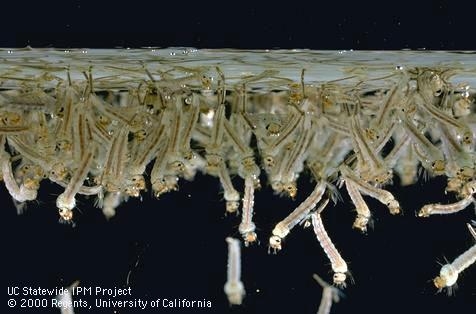Mosquitoes Are Coming

A cluster of mosquito larvae in a small pool of standing water. Photo Credit: https://ucanr.edu/blogs/blogcore/postdetail.cfm?postnum=10847 Photographer: Jack Kelly Clark https://ucanr.edu/News/?uid=666&ds=191
Mosquitoes are arguably the most annoying creatures on the planet, and it is very likely that this upcoming year may be filled to the brim with mosquitoes for Forsyth County due to the conditions for their flourishment which are next to perfect.
The two things that are most important to the lives and reproduction of mosquitoes year by year are both warmth and precipitation. Without those, you can be pretty confident you will not have to deal with the little annoyances. Unlucky for us, the conditions are set for 2021 to be a year polluted with mosquitoes, and if you haven’t noticed, this summer has been filled with rain, rain, and also rain, JUst what mosquitoes need to thrive. It is early September and we are already less than two inches away from our annual average for rainfall, with 47.87 inches of rain so far. Any hopes for a prolonged winter to keep the mosquitoes at bay can be squashed as well; for the beginning of the mosquito season (from February to April) will have a projected temperature range of 50 to 60 degrees Fahrenheit. Those are quite literally the perfect conditions for mosquitoes to flourish.
Outside of their annoyances as blood-sucking pests that upset everyone they encounter, these mosquitoes are more than likely to have some noticeable, negative impacts on the agricultural economy of Forsyth. Our output of livestock is Forsyth’s largest form of agricultural income taking up around 50.3% of our farmland, and making up around $29,093,000 of income for the county. This influx of mosquito populations could lead to a massive drop in the income from livestock in Forsyth, causing some possible serious economic consequences. This effect from the mosquitoes becomes relevant when mosquitoes who carry disease with adverse effects on livestock appear.
“If attacked by mosquitoes, cows give less milk, and beef cattle, sheep, and poultry suffer losses in weight,” Sanon P. Lawler and Gregory C. Lanzaro from the Department of Entomology, at the University of California, claimed. These losses in weight and lowering of milk outputs can be the direct thing that impacts agricultural income for our community.
Although mosquitoes pose a major problem, prevention of their breeding in and around farms is possible; impounded water sources, an accumulation of water in a reservoir for immediate or future use, should have cleared banks and be stocked with insect consuming fish. Even things such as improper lighting can have massive effects on attracting mosquitoes; field ditches should be commonly drained to prevent pools of standing water for their breeding and even keeping up road conditions, by preventing/removing potholes or cracks where standing water can pool, can help slow or stop mosquitoes from breeding.
Your donation will help support The Lambert Post, Lambert High Schools student-run newspaper! Your contribution will allow us to purchase equipment and cover website hosting costs.












